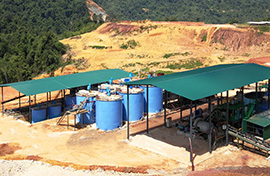-
 E-mail
xhcnlite@ytxinhai.com
E-mail
xhcnlite@ytxinhai.com
-
 Call Us
008613641173523
Call Us
008613641173523
 E-mail
xhcnlite@ytxinhai.com
E-mail
xhcnlite@ytxinhai.com
 Call Us
008613641173523
Call Us
008613641173523
2025-05-29 Views: 2522
Warm Tip: If you want to know more information, like quotation, products, solutions, etc., please Click here ,and contact us online.

Placer gold deposits are diverse and widely distributed. Due to the free-state occurrence of gold in placer deposits and the significant density difference between gold and gangue minerals, gravity separation is an ideal and efficient method for gold extraction.
The beneficiation process primarily involves first recovering gold (with a recoverable particle size minimize generally of 0.01 mm) and associated heavy minerals from raw ore through gravity separation, followed by separating gold from other heavy minerals using gravity, flotation, magnetic separation, electrostatic separation, or combined processes to achieve comprehensive recovery.
The commonly used process flow includes washing, screening, gravity separation, and concentration stages.
Washing is a critical preparatory step before beneficiation, aiming to separate gravel, sand, and clay while cleaning adhered fine clay and gold particles from gravel. Placer ores often contain weathered clay that binds gold into agglomerates or sludge. Without prior disaggregation, these agglomerates would be discarded during screening, reducing gold recovery.
Washing involves water and mechanical agitation (e.g., flat vibrating screens, trommel scrubbers, or rotary screens) to break down clay-gold agglomerates, improving ore processability and recovery rates.

Screening removes large gold-free gravel (20–40% of waste) to enhance efficiency.
Wet screening with water is typically employed to disperse sludge. Screen aperture sizes (10–20 mm) are determined by gold particle size distribution in the ore. For fixed chutes in roughing, apertures may exceed 60 mm. Fixed plants use vibrating or grizzly screens, while dredges utilize trommel screens.

Gravity separation is the core process for placer gold due to gold’s high density (0.074–2 mm particle size) and cost-effectiveness. Key equipment includes jigs, shaking tables, and sluices, which remove gangue and yield coarse gold concentrates:
Effective for coarse particles (≥0.04 mm) with a density difference ≥1.25, offering high throughput and simplicity in roughing.

Suitable for fine particles (0.074–0.5 mm), providing stable separation, visible concentrate bands, and high upgrading ratios. Types include:
Coarse Sand Table: 0.5–2.0 mm.
Fine Sand Table: 0.074–0.5 mm.
Slime Table: 0.037–0.074 mm.

Coarse Sluices: Handle up to 200 mm feed, recovering gold ≥0.074 mm.
Fine Sluices: For beach placers (-2 mm).
Sand Sluices: 2–0.074 mm.
Slime Sluices:<0.074 mm.

Concentration further upgrades gold using gravity, magnetic, flotation, electrostatic separation, or combined methods. This step minimizes gold loss and maximizes recovery of gold and heavy minerals. Equipment selection must align with ore characteristics to ensure efficiency.

Dewatering (thickening + filtration) is required for wet processes (gravity, magnetic, flotation) before dry electrostatic separation. This ensures proper moisture control for downstream operations.
Note: The selection of processes and equipment depends on ore properties, plant conditions, and budget. Customized solutions from qualified manufacturers are recommended to optimize recovery and cost-effectiveness.

Note: The selection of processes and equipment depends on ore properties, plant conditions, and budget. Customized solutions from qualified manufacturers are recommended to optimize recovery and cost-effectiveness.
Welcome to contact us for any questions!
No. 188, Xinhai Street, high-tech Industrial Park, Fushan District, Yantai, Shandong, China.

Please leave your message here! We will send detail technical info and quotation to you!